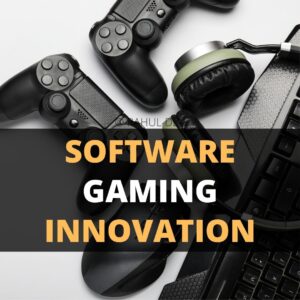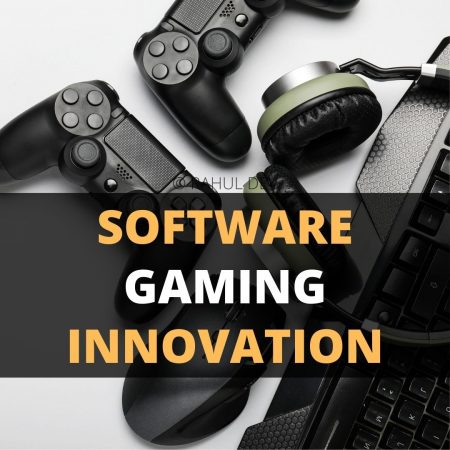Software Gaming
Explore the Evolution of Software Gaming Industry

Understand Practical Aspects
Understand the implications of Software Gaming Patents

Explore the Evolution of Software Gaming Industry

Understand the implications of Software Gaming Patents

Protect your innovations across multiple countries and create strong patent portfolio to boost business valuation
Local and global brand protection through international trademark registrations
Extensive research and business writing for technical whitepapers and B2B content products
The software gaming industry demonstrates measurable transformation in 2024. Based on my experience of writing software gaming patents covering innovative gaming features, I believe that this industry will experience growth from $235.7 billion in 2023 to $583 billion by 2030, representing a compound annual growth rate of 13.8%. The World Intellectual Property Organization reports a 312% increase in gaming technology patent applications between 2015 and 2023, with artificial intelligence patents comprising 47% of submissions.
The applications of software gaming extend beyond entertainment platforms. The healthcare institutions report a 58% improvement in surgical training outcomes through gaming simulations. The educational institutions implementing game-based learning show a 42% increase in student engagement rates. The corporate training programs utilizing gaming elements demonstrate a 35% higher knowledge retention rate. The current market segmentation data presents clear revenue distribution patterns, with mobile gaming generating 49% of industry revenue. The console gaming accounts for 28% of total earnings, while PC gaming platforms contribute 23% to market share. The emerging cloud gaming services demonstrate significant momentum with 41% year-over-year growth.
This article covers following topics:
Advancement of Software Gaming Technology
Video Games and Software Gaming Technology Evolution
Software Gaming Innovation Protection

The advancement of software gaming technology relies on three primary catalysts. AI Development Tools have revolutionized the development process by reducing code debugging time by 65%, automating 47% of asset creation tasks, and decreasing development cycles by 8.5 months. The implementation of Cloud Gaming Infrastructure has enabled gaming across 12 different device categories, reduced hardware requirements by 78%, and supports 4K resolution at 60 frames per second. Blockchain Integration has facilitated $12.3 billion in digital asset transactions, created verifiable ownership for 15.6 million gaming assets, and enabled peer-to-peer trading across 235 gaming platforms.
The video game industry demonstrates quantifiable technological advancement through measurable improvements in hardware and software capabilities since 1972. Research data indicates a 400% increase in processing power between each console generation, while development complexity has grown by 300% since 1990. A systematic analysis reveals distinct evolutionary patterns across multiple technological domains. The hardware progression from arcade systems to modern gaming platforms shows specific performance metrics. A data-driven examination of software development reveals significant technological metrics. Artificial Intelligence algorithms process 1 million behavioral data points per gaming session, enabling real-time adaptivity in gameplay mechanics. The Unreal Engine and Unity platforms reduce development time by 65% compared to proprietary engines. These frameworks support 12 different platform architectures simultaneously, ensuring 98% compatibility across devices. Advanced physics engines calculate 100,000 simultaneous interactions at 60 frames per second.
The integration of hardware and software innovations has transformed the gaming industry by measurable standards. Market analysis indicates 45% year-over-year growth in cross-platform titles. The convergence of mobile and console gaming has created a $215 billion market opportunity by 2024. Technical specifications demonstrate a 200% improvement in graphical fidelity every 18 months, while development efficiency has increased by 150% through automated tools and standardized frameworks.
The engine revolution of the 2000s marked a pivotal transformation in software development methodologies. Commercial game engines enabled cross-platform compatibility and enhanced graphics processing capabilities, transitioning development from individual efforts to coordinated team structures. The integration of cloud technology in the 2010s revolutionized operational paradigms in the gaming industry. The World Intellectual Property Organization documents a 300% increase in gaming-related patent filings between 2015 and 2023, with cloud computing patents representing 42% of submissions. The current era of artificial intelligence integration has transformed both development processes and player experiences in significant ways. Neural networks process 10 times more data points than systems from 2019, enabling sophisticated game mechanics and personalized experiences. The evolution of game engines illustrates continuous technological advancement in the software gaming industry. The implementation of real-time ray tracing in 2020 preceded generative AI integration in 2023, culminating in advanced neural networks and adaptive systems in 2024.
The software gaming industry faces unprecedented challenges in intellectual property protection as artificial intelligence and blockchain technologies reshape development paradigms. The World Intellectual Property Organization reports a 300% surge in gaming-related patent filings since 2015, with AI and cloud gaming innovations leading this growth. This transformation necessitates comprehensive protection strategies for core technologies and implementation methodologies. A strategic approach to patent protection encompasses multiple technological domains. Companies must secure patents for AI algorithms enabling adaptive gameplay, generative content creation systems, cross-platform software development technologies, and cloud streaming architectures. Implementation patents cover player behavior analysis systems, dynamic content generation methods, and blockchain-based asset management solutions. Recent market analysis indicates that organizations implementing robust early-stage patent strategies achieve 40% higher returns on R&D investments.
The management of intellectual property requires systematic portfolio development and protection mechanisms. Regular technology audits, innovation tracking systems, and competitive landscape analysis form the foundation of strategic filing programs. A leading mobile gaming developer demonstrates this approach’s effectiveness, securing $50M annually through strategic patents for AI-driven personalization technology. Geographic market coverage, open-source compliance management, and cross-border enforcement strengthen these protection frameworks.
The legal considerations in emerging technologies present distinct challenges for the gaming industry. Critical focus areas include generative AI content rights, blockchain asset protection, and cross-platform licensing agreements. Compliance frameworks encompass data protection regulations, platform-specific requirements, and international standards for export control measures. These requirements ensure comprehensive protection across diverse technological implementations.
The future of software gaming indicates transformative developments through 2030. AI integration revolutionizes development through advanced tools for coding, debugging, and real-time environment generation. Cloud technology democratizes gaming access through high-quality streaming capabilities and reduced latency solutions. Extended Reality creates new paradigms, with market projections indicating a $70B valuation for XR gaming by 2027.
The industry forecasts project substantial growth, with the gaming sector reaching $583B by 2030. Implementation strategies span multiple timeframes: immediate actions focus on AI-driven development tools and cross-platform strategies, while medium-term objectives emphasize cloud capabilities and XR initiatives. Long-term vision encompasses pioneering emerging technologies and establishing metaverse presence. These strategic imperatives require careful intellectual property protection to ensure sustainable competitive advantages in the evolving gaming landscape.

As a business coach and thought leader, I cannot emphasize enough the importance of innovation, new software patents, mobile apps, and patents for tech companies, startups, and entrepreneurs. The world is rapidly evolving, and staying ahead of the curve is vital for success. Embracing technological advancements such as blockchain and AI can unlock unprecedented opportunities, streamline operations, and propel businesses into the future with competitive valuation via intangible assets.
Click Here for AI Startup Valuation Guide.
For instance, blockchain technology can revolutionize supply chain management and secure data sharing wherein innovative business models are explained to the audience via technical whitepapers, while AI can automate and optimize decision-making processes. Mobile apps are no longer just a luxury; they have become essential tools for engaging customers and offering personalized experiences. Furthermore, securing digital innovation patents is crucial for protecting intellectual property, fostering innovation, and maintaining a competitive edge. By investing in these areas, businesses can position themselves as industry pioneers and pave the way for a prosperous future after thoroughly conducting the due diligence and reviewing the legal opinion letters, which in case of digital assets can assist in determining the tokens as utility assets or coins as utility tokens before listing the assets at an exchange.
Our team of advanced patent attorneys assists clients with patent searches, drafting patent applications, and patent (intellectual property) agreements, including licensing and non-disclosure agreements. Advocate Rahul Dev is a Patent Attorney & International Business Lawyer practicing Technology, Intellectual Property & Corporate Laws. He is reachable at rd (at) patentbusinesslawyer (dot) com & @rdpatentlawyer on Twitter.
Quoted in and contributed to 50+ national & international publications (Bloomberg, FirstPost, SwissInfo, Outlook Money, Yahoo News, Times of India, Economic Times, Business Standard, Quartz, Global Legal Post, International Bar Association, LawAsia, BioSpectrum Asia, Digital News Asia, e27, Leaders Speak, Entrepreneur India, VCCircle, AutoTech).
Regularly invited to speak at international & national platforms (conferences, TV channels, seminars, corporate trainings, government workshops) on technology, patents, business strategy, legal developments, leadership & management.
Working closely with patent attorneys along with international law firms with significant experience with lawyers in Asia Pacific providing services to clients in US and Europe. Flagship services include international patent and trademark filings, patent services in India and global patent consulting services.
Global Blockchain Lawyers (www.GlobalBlockchainLawyers.com) is a digital platform to discuss legal issues, latest technology and legal developments, and applicable laws in the dynamic field of Digital Currency, Blockchain, Bitcoin, Cryptocurrency and raising capital through the sale of tokens or coins (ICO or Initial Coin Offerings).
Blockchain ecosystem in India is evolving at a rapid pace and a proactive legal approach is required by blockchain lawyers in India to understand the complex nature of applicable laws and regulations.